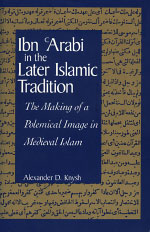|
|
| |

|

|
Knysh A. Ibn ‘Arabi in the Later Islamic Tradition: The making of a polemical image in medieval Islam, SUNY Press, 1999 (449 pp.)
“Knysh has looked at exactly who were the supporters and opponents of Ibn ‘Arabi for several centuries after his death, where they were getting their information, why they should have taken the position they took, and so forth. The author brings together a lot of tidbits in the secondary literature that people have not connected, and he does so with careful attention to the primary texts.”
William C. Chittick, author of The Self-Disclosure of God: Principles of Ibn al-‘Arabi’s Cosmology.
This book examines the fierce theological controversy over the great Muslim mystical thinker Ibn ‘Arabi (1165-1242). Even during his lifetime, Ibn ‘Arabi’s conformity with the letter of the Muslim dogma was called into doubt by many scholars who were suspicious of the monistic (unitive) tendencies of his metaphysical teaching, of his claims to be the Prophet’s successor and restorer of the true meaning of the Islamic revelation, and of his allegorical interpretation of the Qur’an.
Following Ibn ‘Arabi’s death, these misgivings grew into an outright condemnation of his teachings by a number of influential thirteenth through fifteenth century theologians who portrayed him as a dangerous heretic bent on undermining the foundations of Islamic faith and communal life. In response to these grave accusations, Ibn ‘Arabi’s advocates praised him as the greatest saint of Islam who was unjustly slandered by the bigoted and narrow-minded critics.
As time went on, these conflicting images of the mystical thinker became rallying points for various political and scholarly factions vying for lucrative religious and administrative posts and ideological denomination. In thoroughly analyzing the heated debates around Ibn ‘Arabi’s ideas throughout the three centuries following his death, this study brings out discursive strategies and arguments employed by the polemicists, the hidden agendas they pursued, and the reasons for the striking longevity of the issue in Islamic literature up to the present day. On the theoretical level, this book reassesses the validity of such common dichotomies as orthodoxy versus heresy, mainstream versus mystical interpretations of Islam, and communalism versus individualism as well as other issues related to the history of Islamic thought.
Excerpt from “Introduction”
Few personages of Islamic intellectual history enjoy the fame of Muhyi ’l-din Muhammad Ibn ‘Ali Ibn al-‘Arabi, or simply Ibn ‘Arabi (560-638 A.H./1165-1240 c.e.), as he was known in the Muslim East. Fewer still are as controversial as this outstanding exponent of Islamic mysticism. Already in his lifetime and especially after his death, Ibn ‘Arabi’s mystical ideas became a stumbling block for Muslim scholars who have tried to find a key to the “Ibn ‘Arabi enigma” ever since. In the process, they have often clashed over the meaning of Ibn ‘Arabi’s breathtaking insights into the mysteries of the cosmos, the Islamic Scripture, and religious faith. Today, as before, Ibn ‘Arabi’s legacy continues to bewilder his readers, both Muslims and non-Muslims alike. Although his vast work has been analyzed in dozens of academic monographs and in hundreds of articles, Ibn ‘Arabi still poses a major intellectual challenge to scholars of Islam. More significantly, an aura of mystery and controversy that has enveloped his name over the last seven centuries has attracted to him not only academics but also a broad nonspecialist audience in the Muslim countries and in the West. In the Muslim world, Ibn ‘Arabi’s abiding importance is attested by a vast body of polemical literature around his name. This is not surprising: from the 7th A.H./13th c.e. centuries onward practically every Muslim thinker of note took it upon himself to define his position vis-a-vis the legacy of this Sufi master.
The present book, however, is not a study of Ibn ‘Arabi per se. His doctrines have been analyzed in scores of scholarly dissertations, some of which will be surveyed further on. It is not my intention to augment or to correct the conclusions reached by my predecessors, who have furnished an accurate, if not always impartial, summary of Ibn ‘Arabi’s ideas. My purpose here is to examine the perception of Ibn ‘Arabi’s personality and teaching by Muslim scholars throughout the four centuries following his death. This, therefore, is a study of image-making and polemics in pre-modern Islam. With this goal in mind I will inquire into the methods and motivations of Muslim scholars, since, as we shall see, Ibn ‘Arabi’s posthumous image was molded largely against the backdrop of the theological controversy over his intellectual legacy. PDF-файлы PDF-файлы
Annotation, Contents, Preface, Introduction
Ключевые слова
ахл ат-таджалли
ал-Бика‘и
биография Ибн ал-‘Араби
ал-Бисати
ал-Бухари
«Величайший учитель»
Дамаск
ал-Джабарти
ал-Джили
«ад-Дурр ас-самина»
аз-Захаби
Ибн ‘Абд ас-Салам ас-Сулами
Ибн Аби-л-Мансур
Ибн ал-‘Араби
Ибн Ахдал
Ибн ал-Мукри
Ибн ал-Мусди
Ибн ар-Раддад
Ибн Таймийа
Ибн Таймийа, его «учение о святости»
Ибн Халдун
Ибн ал-Хатиб, вазир
Ибн ал-Хатима
иерархия суфийских «гностиков»
ислам
Йемен
ал-Казвини
Каир
ал-Кари ал-Багдади
ал-Касталлани
ал-Кирмани
критики Ибн ал-‘Араби
мамлюки
противники Ибн ал-‘Араби
«Раудат ат-та‘риф»
Расулиды
сторонники Ибн ал-‘Араби
суннитский ислам
суфизм
суфийская община Забида
ат-Тафтазани
ал-Фаси
хакика [истина]
аш-шайх ал-акбар
шари‘а
|
|
|
|
Случайная новость: Объявления |
|
22 мая 2024 г. (среда) в 14:00 состоится заседание Ученого Совета, на котором будет заслушан доклад c.н.с., Ph.D. Н.В. Ямпольской «Маргиналии как ключ к реконструкции процесса работы скрипториев в Монголии XVII века». |
|
Подробнее...
|
|
|
|
|

